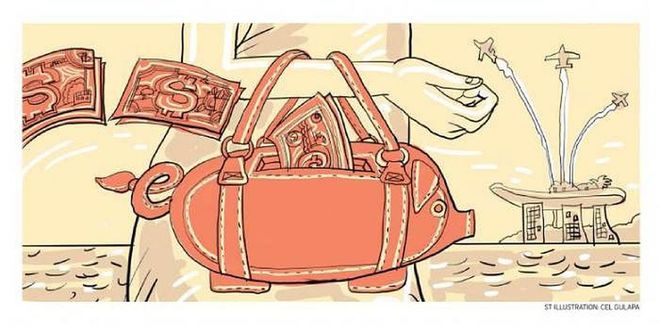54 Ways To Save And Get Savvy With Your Money
Here are 54 top money tips covering a wide range of areas – from saving, insurance and investing to legacy planning and consumer protection


ILLUSTRATION: CEL GULAPA/THE STRAITS TIMES
ST Save money feature image
THE BASICS
1. FINANCIAL VISION
Start with an end in mind. Do you need to plan for your first home, children’s education and retirement? How do you reconcile the concepts of “you only live once (Yolo)” and “financial independence, retire early (Fire)”?
2. FINANCIAL PLAN
It details how you want to protect, accumulate, preserve and distribute your resources to help you achieve your objectives. Without a plan, you are planning to fail.
3. PRIORITISE GOALS
Resources are limited but wants are unlimited. Differentiating between needs and wants is essential to help you arrive at an effective budget. Which financial goals are most important to you now?
4. FINANCIAL CALENDAR
Create a spreadsheet with milestones for hitting your short-term and long-term goals, and track them.
5. ACHIEVABLE MONEY GOALS
Set realistic shorter-term goals that are achievable so that you are encouraged to pursue your vision in incremental steps.
6. CALCULATE FUTURE COST
Would you rather spend the money now or save part of it for the future by compounding and growing it?
7. SET UP A BUDGET
This is a tool to help you visualise where your money is being spent and identify where expenses can be reduced.
8. BUDGET WITH THE FAMILY
Share the responsibility with family members. When everyone cuts back a little, it can make a big difference.
9. CASH ENVELOPE
Set aside cash in your e-wallet to last you a week or month for discretionary expenses and stick to it.
10. KEEP RECEIPTS
You will be less likely to overspend.
Related article: 5 Basic Steps To Retirement Planning For Young Couples
SAVINGS
11. EMERGENCY FUND
Set aside at least three to six months of your monthly expenses as liquid cash savings for contingencies.
12. CULTIVATE THE SAVING HABIT
Start developing the habit of saving as soon as you get your first pay cheque, whether it is saving for your first home, your wedding or for big milestones to come. Start small, but save regularly.
13. SAVE AT LEAST 20% OF INCOME
Set aside savings of at least 20 percent of your income on a recurring basis. Aim for a higher percentage when your income grows.
14. SAVE YOUR BONUSES
Try to save most of your bonuses.
15. PAY YOURSELF FIRST
Set up a Giro arrangement so that part of your monthly pay goes to a separate savings account. Better still, do not link an ATM card to this account to prevent quick access.
16. PAY OFF STUDY LOANS
If you have taken a study loan, have a plan to pay off the outstanding amount by allocating a part of your income towards it. Interest that is charged on the borrowed amount
will be compounded over time, so it is prudent to redeem the loan as early as possible.
17. PAY OFF HIGH-INTEREST DEBT FIRST
By doing so, you avoid these high-interest debts from ballooning out of control.
18. TRACK YOUR SPENDING
Use an app to track your expenditure on a daily and monthly basis.
19. USE A DEBIT CARD
People who chalk up huge debts usually blame it on their easy attitude towards credit cards, which charge customers up to 24 per cent a year in interest for late payments.
20. DO YOU HAVE TOO MUCH IN SAVINGS?
Inflation will erode your savings.Consider investing to accumulate your wealth once you have set aside about six months of emergency cash and taken care of your insurance
needs.
INSURANCE
21. ADDRESS YOUR NEEDS
Understand how insurance plans can address short- and long-term goals. Consider the sustainability of meeting premium payments throughout the plan’s tenure and the penalties should you opt for early redemption.
22. COMPARE FIRST
Compare and find insurance products most suited to your financial objectives. One website that aggregates life insurance plans is compare First,an industry-led initiative.
23. TERM INSURANCE
If you have dependants, consider getting a term insurance plan,which typically costs less than a whole life plan for similar sums assured.
24. HOSPITALISATION & SURGICAL INSURANCE
An example of hospitalisation insurance cover is the Integrated Shield Plan which covers hospital stays and specified outpatient visits. It typically covers A/B1-type wards in public hospitals or private hospitals.
25. CRITICAL ILLNESS INSURANCE
Critical illness plans are structured to pay out a lump sum if the policy holder is diagnosed with a serious illness such as cancer. This helps provide much-needed financial security in times of a health crisis.
26. CPF LIFE
The CPF Life is a national annuity scheme offering income payouts for life upon retirement. Save for and beyond it to secure your retirement.There are three CPF Life
plans.Understand what each plan offers and select a suitable one when you want to start your payouts from your payout eligibility age.You can defer your payouts, until 70 at the latest. Doing so means you would enjoy up to 7 per cent more in monthly payouts for each year deferred.
27. LONG-TERM CARE
Consider the higher coverage from supplementary plans to complement your severe disability Elder-Shield or CareShield Life plans. One in two healthy Singaporeans aged 65 could be severely disabled in his lifetime.
28. CARESHIELD LIFE
CareShield Life will be compulsory next year for those between the ages of 30 and 40. Future cohorts will join automatically at the age of 30. People above 40 in 2020 can stick with ElderShield or switch to the new scheme in 2021 by topping up their premiums.
29. MORTGAGE INSURANCE
If you have a home loan, it is prudent to buy mortgage insurance to cover you and your family should you face any unfortunate situation.
30. AT POINT OF SALE
Expect to be given certain documents, including a “Your guide to life insurance” booklet, a product summary, a policy illustration and a bundled product disclosure document (depends on product), even if you buy on a “no advice” basis.
Related article: Consider These Important Things When Buying Life Insurance For Your Family
INVESTMENT
31. POWER OF COMPOUNDING
Starting to invest early would enable compounding to work to your advantage. If returns and dividends from investments are re-invested regularly, the total investment portfolio value will potentially accumulate over time.
32. RULE OF 72
To find the number of years required to double your money at a given interest rate, you divide 72 by the expected return. For example, if you want to know how long it will take to double your money at 5 percent interest, divide 72 by 5 and you get 14.4 years.
33. INVESTMENT OPTIONS
Options include safe investment tools like Singapore Savings Bonds to relatively riskier ones like equities,exchange-traded funds (ETFs)and unit trusts.Investors who prefer to delegate the task to experts can consider investing in unit trusts or ETFs, and track market indexes.
34. WORST-CASE SCENARIO
Most retail investors focus on the returns and picture the best-case scenario.Discipline yourself to ask what is the worst-case scenario and if you can take the risk of it happening.
35. MINIMISE INVESTMENT COSTS
Investment-related costs like sales charges, expense ratios, fund management fees, trailer fees, hurdle rates and performance fees will eat into your returns. Be aware of these costs and consider low-cost investment tools.
36. RISK VERSUS RETURNS
Consider how much risk you feel comfortable with. Also, do you have the capacity and do you need to take the risk?
37. DOLLAR-COST AVERAGING
Invest equal amounts regularly over a long period so as to buy more units or shares when prices are low and fewer when prices are high. The advantage is that you lower your cost of investment and reduce the risk of investing at a peak.
38. SUPPLEMENTARY RETIREMENT SCHEME
A national voluntary scheme that enables you to save on taxes while you build your nest egg.
39. DON’T TRY TO TIME THE MARKET
It is difficult to time the market, which moves in cycles. Those who time the market typically miss the run-up.
40. DIVERSIFY AND REBALANCE YOUR PORTFOLIO
Fine-tune your diversified portfolio periodically by buying and selling portions of it so as to bring it back inline with your risk profile and asset allocation.
LEGACY PLANNING
41. LEAVE A WILL
Decide on how you wish to distribute your estate and ensure a speedier and hassle-free distribution upon your death.
42. CPF NOMINATIONS
Some of your financial resources – for example, CPF savings – cannot be distributed via a will.
43. LASTING POWER OF ATTORNEY
Decide your donee(s) in advance in case you become mentally incapacitated.
44. TRUSTS
A trust can protect family assets that might otherwise go to beneficiaries who are minors, financially immature or have special needs.
45. ADVANCE MEDICAL DIRECTIVE
To reduce the trauma of family members having to make difficult decisions, inform your doctor in advance that you do not want the use of any life-sustaining treatment to prolong your life in the event that you become terminally ill, unconscious and where death is imminent.
Related article: Save Money And The Environment By Shopping These Pre-Loved Luxury and Fashion Items
CONSUMER PROTECTION
46. ASK, CHECK AND CONFIRM
Beware of financial scams. There is no free lunch, so ensure that you fully understand the investment opportunity.
47. DUE DILIGENCE
Do not be quick to believe. Conduct due diligence like finding out when the firm was set up, the people behind it and the terms of the contract. What is your legal recourse if it
falls through?
48. NEGATIVE COMMENTS
It is worthwhile to check if there have been any complaints or negative comments about the firm, owners, directors and management. Check online forums and newspapers.
49. INVESTOR ALERT LIST
It is a list of unregulated persons who, based on information received by the regulator, may have been wrongly perceived as being licensed or authorised by the Monetary Authority of Singapore. The list has grown from 25 in 2004 to more than 200 now.
50. PHISHING
It is a way of obtaining your sensitive personal information, such as bank account details, personal identification numbers (PIN), passwords and credit card numbers, among others, in order to perform unauthorised banking transactions. You should never give out your user ID, iBanking PIN or onetime passwords over the phone or via e-mail.
MEANS TO AN END
51. HEALTH
Health is wealth. Reduce your medical costs by eating healthily and exercising regularly.
52. EXPERIENCE
Spend on experiences, not things.
53. FAMILY AND FRIENDS
Inculcate family members and friends with similar money attitudes and healthy lifestyles.
54. GIVE AND BE INVOLVED
It is better to give than to receive. Besides cash donations, experience the joy of giving your time and effort.
This article originally appeared on The Straits Times.